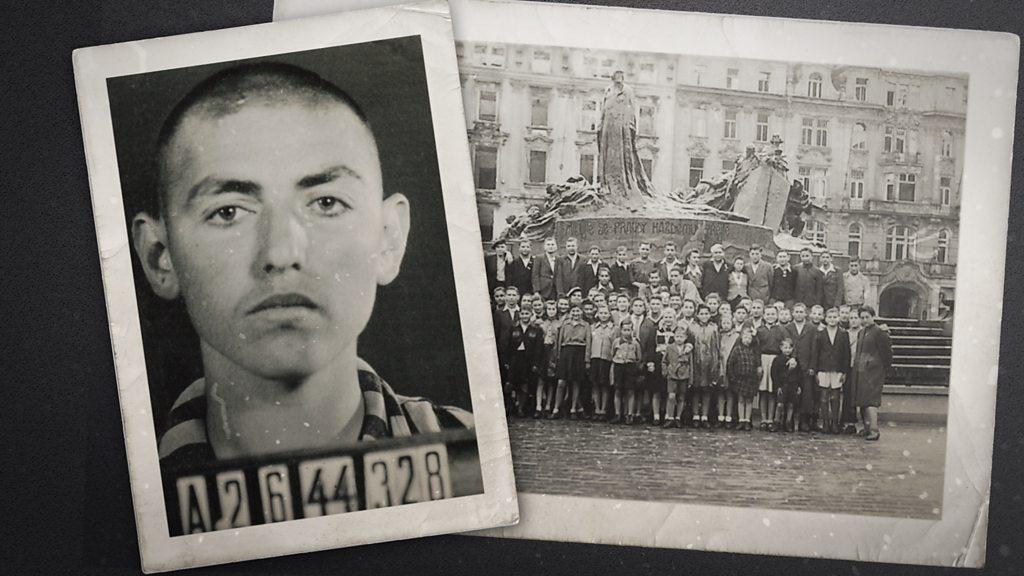Holocaust survivors share experiences with NI schoolchildren
- Published
Bergen-Belsen survivors meet 74-years after their liberation
It's been 74 years since the Bergen-Belsen concentration camp was liberated by British troops during World War Two and in Belfast, thousands of miles away, two of its survivors are meeting for the first time.
It's a Wednesday afternoon. They are in a synagogue. It's a typical, dull October day.
The two strangers embrace, already feeling familiar, already smiling. The same word is used by both of them to describe the meeting: 'Special'.
Born to Jewish farmers in Czechoslovakia in 1935, Tomi Reichental lived on the farm until he was eight.
Aged nine, after having gone into hiding in an attempt to evade new laws restricting the movement and rights of Jewish people, he and his family were caught and taken to Belsen in northern Germany.
Susan Pollock was born in Hungary in 1930.
After being forced from their home, her family had hopes of resettling somewhere they would be safe, as Jews.
Instead, she ended up in Auschwitz-Birkenau in Poland in May 1944.
She wouldn't arrive at Belsen until 1945, after being forced to march from Auschwitz, barefoot and starving, in the freezing eastern European winter.
Fast forward seven decades. Despite meeting for less than a hour, Tomi and Susan say they feel as though they've known each other for years.
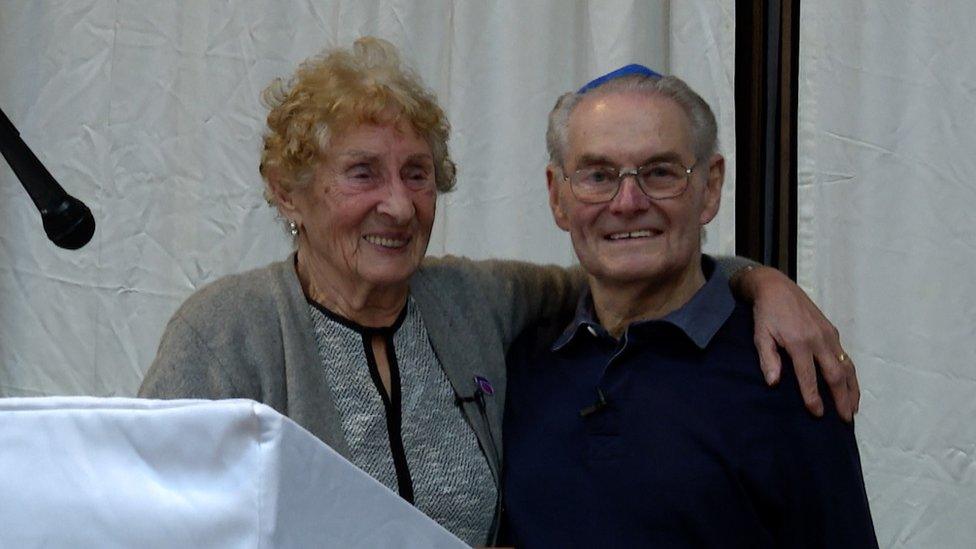
Susan and Tomi met for the first time in a Belfast synagogue
"There is a trust that exists between the survivors," says Susan.
Tomi agrees: "It's like we belong to a club."
Susan and Tomi spent two weeks in Northern Ireland speaking to school children and various groups about their experiences ahead of Holocaust Memorial Day in January.
Organised by the Executive Office, a devolved Northern Ireland government department, hundreds of students have heard the personal accounts of both Susan and Tomi about their treatment during the Holocaust.
About 70,000 people died in Belsen, including one of the world's most famous diarists, Anne Frank.
Susan lost 50 members of her family during the Holocaust. Thirty-five members of Tomi's family died.
He says it can be "difficult" to describe his experience in Belsen.
'I lost my childhood'
"I played among corpses that were decomposing and rotting away," he says.
"I lost my childhood in the Holocaust. It was a horrific time."
This is something Susan knows all too well.
The last moments she spent with her mother were at the gates of Auschwitz just before they were separated. Her mother was sent to the gas chambers.

What was the Holocaust?
The Holocaust was a period in history at the time of World War Two (1939-1945), when millions of Jewish people and others were killed in Nazi concentration camps across Europe.
Jews were the main target of the Nazis, and the greatest number of victims were Jewish. Nearly seven out of every 10 Jews in Europe were murdered because of their identity.
Bergen-Belsen, in northern Germany, started out as a camp for Allied prisoners of war. In 1943, it became a Nazi concentration camp.
It was liberated by British troops in April 1945. They found 60,000 prisoners when they entered the gates, suffering from malnutrition, disease and the brutal treatment they had endured.
Thousands of corpses also lay, unburied, on the camp grounds.

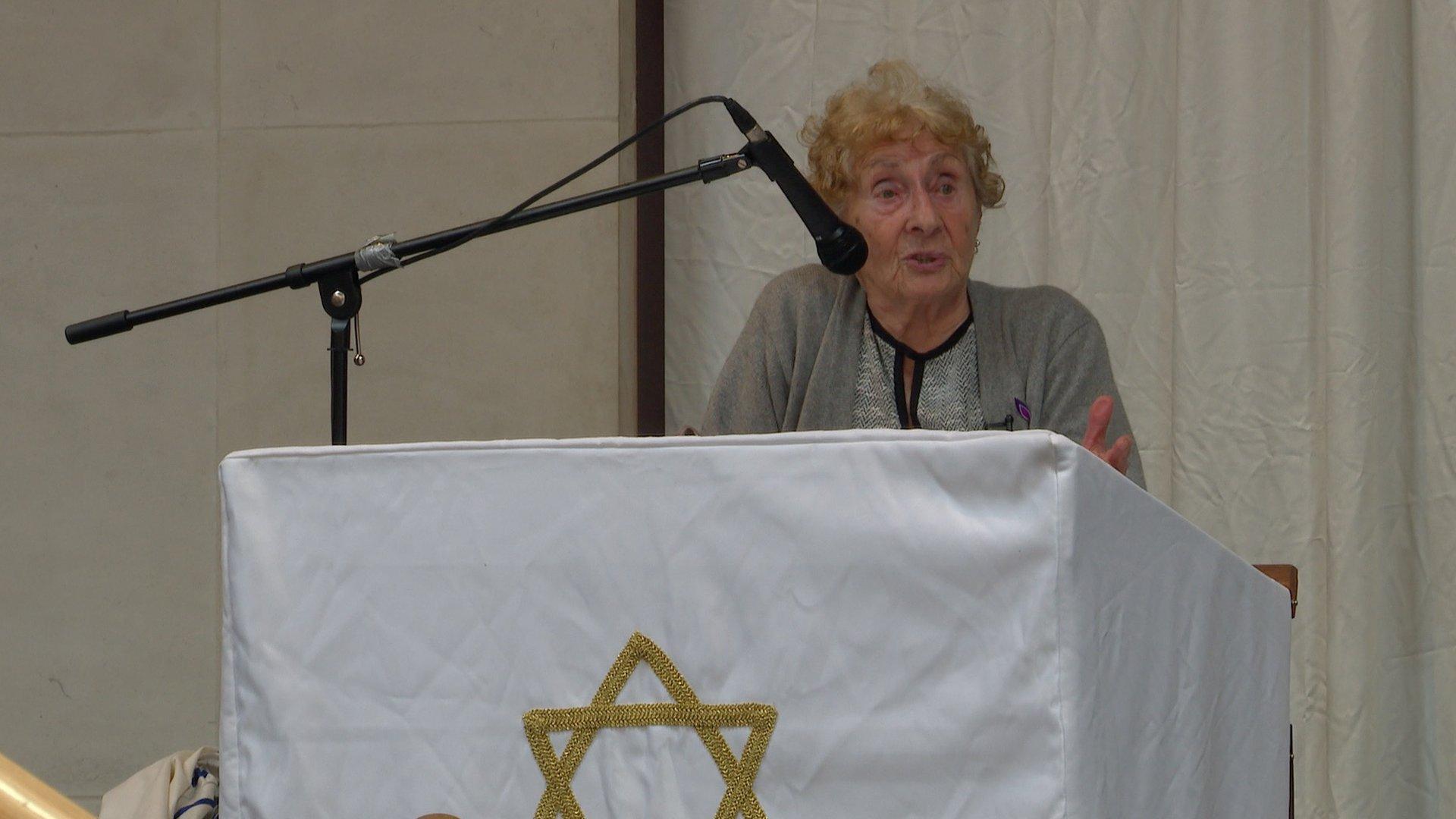
Susan speaks to school students and members of the Jewish community in the synagogue
The pair visited Belfast's synagogue, where they met members of Northern Ireland's Jewish community and spoke to students.
Tomi believes it is important that everyone - particularly young people - hears what went on during World War Two.
"Today we see the refugees. They also endure persecution, rape, murder, and they're trying to find a sanctuary somewhere in Europe," he said.
"That's why I talk to young people. We must not allow history to repeat itself."
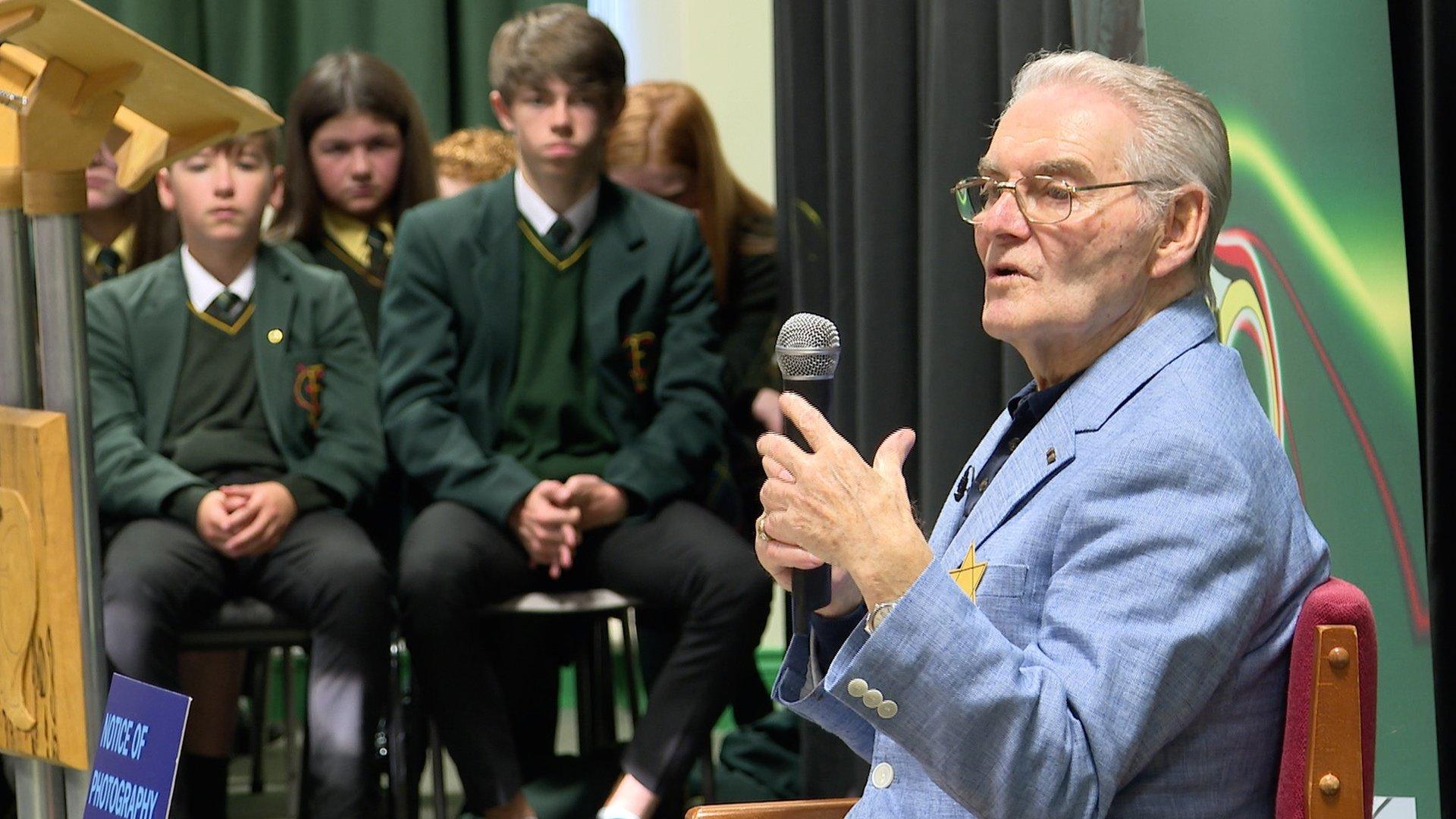
Tomi speaks to school students at St Catherine's College in Armagh
Susan said: "Yes, there are differences between people but we need to respect those differences."
It was a message well received by students attending their talks.
"It's a good thing to be talking about," says Ben Watson, from Newtownhamilton High School.
"It teaches people what's good and what's bad so things like that won't happen again."
'Incredible'
Year 14 student Meabh O'Hagan from St Catherine's College in Armagh agrees.
"I learned how important it is to stand up for people who are treated wrongly," she says.
"It was incredible to have the opportunity to listen to someone who experienced the Holocaust first hand."
Although both Susan and Tomi now speak openly about what they went through, they weren't always able to do so.
"I didn't talk about it for 55 years," says Tomi.
"I lost my wife in 2003 to cancer and she didn't know anything about me. I never told her and I was 43 years married to her."
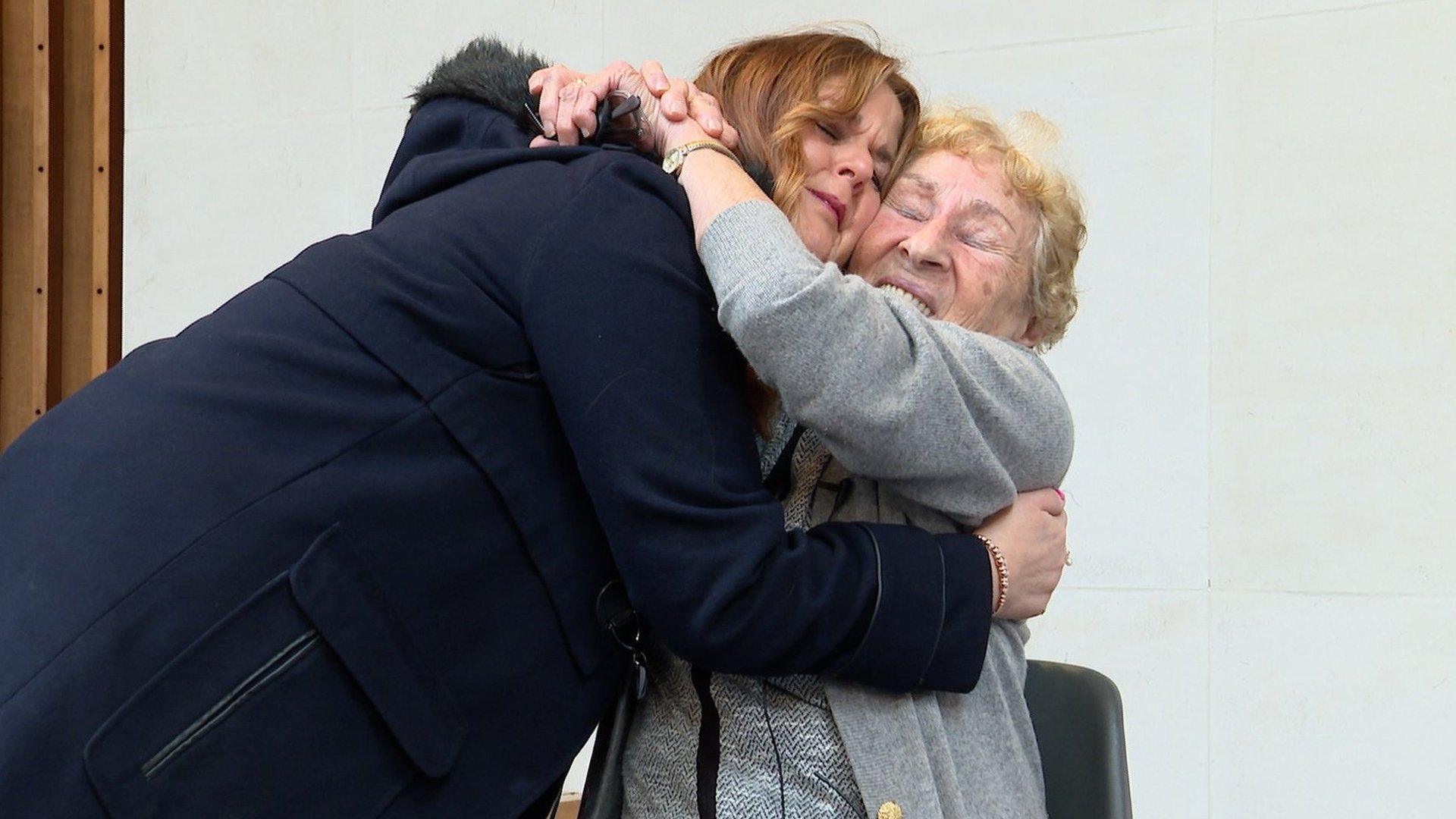
Susan hugs a well-wisher after her talk
Susan's husband was a Holocaust survivor but she didn't speak much to her children about what she went through.
"I suppose the horror and the tragedy that befell us having lost family, I mean incredible suffering we went through.
"You wanted to kind of bury it."
'You can't forget'
Forgetting, however, is something Susan says she can never do.
"You can't forget, ever."
She chooses instead to "not give it much space".
Tomi sums up why he now talks to others: "I feel like I have to, because I think I owe it to the victims that their memory is not forgotten."
After the liberation of Belsen, Susan was sent to Sweden.
She was hospitalised for typhoid, tuberculosis and severe malnutrition. Later, she moved to Canada where she met her late husband, a fellow survivor of the Holocaust.
Now aged 88 and living in London, Susan has three children and six grandchildren.
Tomi, now 84, is one of three Holocaust survivors living in Ireland.
- Published15 April 2015
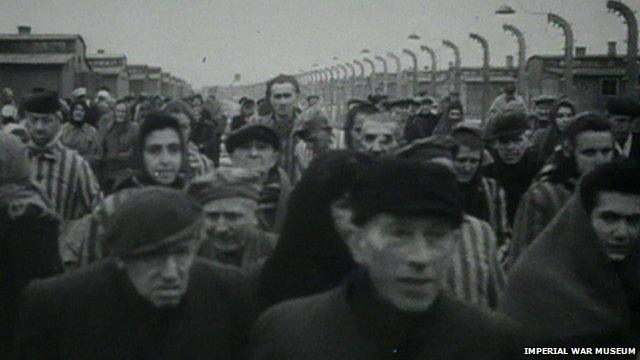
- Published6 August 2019
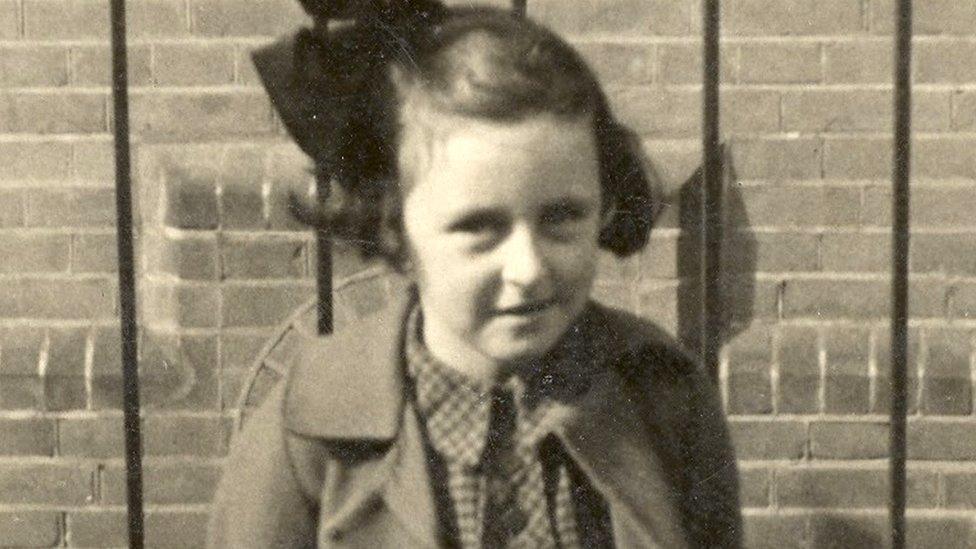
- Published23 June 2019
